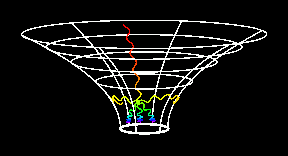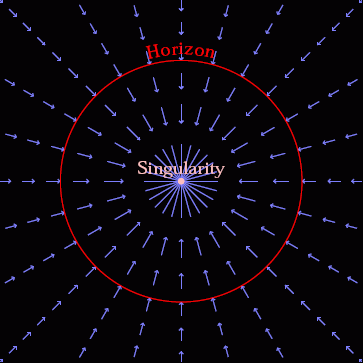Photon redshift for Schwarzschild black holes
https://en.wikipedia.org/wiki/Gravitational_redshift
 2 G M
Rs = -------
c^2
R1 (R2 - Rs)
f1 = f2 sqrt[ -------------- ]
R2 (R1 - Rs)
f2 - f1
z = ---------
f1
Where Rs = Schwarzschild radius
M = black hole mass
G = gravitational constant
c = speed of light in vacuum
f1 = observed frequency
R1 = observer distance from singularity (ie. center of mass of the black hole), > Rs
f2 = emitted frequency
R2 = emitter distance from singularity, > Rs
z = redshift
[-z = blueshift]
Calculated in two phases,
phase 1: Photon redshift from different emitter distances as observed at R1.
Emitter starts at 1e12 meters away from the black hole, and approaches
all the way to 1e-24m (billionth of a proton radius, or so).
For each emitter distance, observed frequency [Hz] and redshift [dimensionless] are displayed.
phase 2: Photon redshift from selected emitter distance at different observer distances.
Observer starts at 1 meter away from the event horizon, and gains distance
up the decades all the way to 1e18m (>100ly)
For each observer distance, observed frequency [Hz] and redshift [dimensionless] are displayed.
Input as optional GET parameters [with default]:
M = mass in Msols [1]
R1 = observer distance in meters [1.49597871e11]
f2 = emitted frequency in Hertz' [1e20]
d = emitter distance from event horizon in phase 2 in meters [0.001]
DIGITS = request more decimal places for calculations [128]
Examples:
Solar mass black hole observed from Earth: http://rubor.org/schwarzschildarb.php
Same but with an emitted visible photon: http://rubor.org/schwarzschildarb.php?f2=0.565e15
Sgr A* from 1au: http://rubor.org/schwarzschildarb.php?M=4.1e6
Gargantua from 3au (~Miller's planet): http://rubor.org/schwarzschildarb.php?M=1e8&R1=4.48e11
10 Sols & emit from 1m above EH in phase 2: http://rubor.org/schwarzschildarb.php?M=10&d=1
Msol, visible, emitted from Rsol: http://rubor.org/schwarzschildarb.php?f2=0.565e15&d=6.957e8
Solar mass observed from Venus, emit a microwave: http://rubor.org/schwarzschildarb.php?f2=2.45e9&R1=108208930000
ESA 360° black hole visualisation
A black hole system to play in Kerbal Space Program -- aesthetic, not physical
2 G M
Rs = -------
c^2
R1 (R2 - Rs)
f1 = f2 sqrt[ -------------- ]
R2 (R1 - Rs)
f2 - f1
z = ---------
f1
Where Rs = Schwarzschild radius
M = black hole mass
G = gravitational constant
c = speed of light in vacuum
f1 = observed frequency
R1 = observer distance from singularity (ie. center of mass of the black hole), > Rs
f2 = emitted frequency
R2 = emitter distance from singularity, > Rs
z = redshift
[-z = blueshift]
Calculated in two phases,
phase 1: Photon redshift from different emitter distances as observed at R1.
Emitter starts at 1e12 meters away from the black hole, and approaches
all the way to 1e-24m (billionth of a proton radius, or so).
For each emitter distance, observed frequency [Hz] and redshift [dimensionless] are displayed.
phase 2: Photon redshift from selected emitter distance at different observer distances.
Observer starts at 1 meter away from the event horizon, and gains distance
up the decades all the way to 1e18m (>100ly)
For each observer distance, observed frequency [Hz] and redshift [dimensionless] are displayed.
Input as optional GET parameters [with default]:
M = mass in Msols [1]
R1 = observer distance in meters [1.49597871e11]
f2 = emitted frequency in Hertz' [1e20]
d = emitter distance from event horizon in phase 2 in meters [0.001]
DIGITS = request more decimal places for calculations [128]
Examples:
Solar mass black hole observed from Earth: http://rubor.org/schwarzschildarb.php
Same but with an emitted visible photon: http://rubor.org/schwarzschildarb.php?f2=0.565e15
Sgr A* from 1au: http://rubor.org/schwarzschildarb.php?M=4.1e6
Gargantua from 3au (~Miller's planet): http://rubor.org/schwarzschildarb.php?M=1e8&R1=4.48e11
10 Sols & emit from 1m above EH in phase 2: http://rubor.org/schwarzschildarb.php?M=10&d=1
Msol, visible, emitted from Rsol: http://rubor.org/schwarzschildarb.php?f2=0.565e15&d=6.957e8
Solar mass observed from Venus, emit a microwave: http://rubor.org/schwarzschildarb.php?f2=2.45e9&R1=108208930000
ESA 360° black hole visualisation
A black hole system to play in Kerbal Space Program -- aesthetic, not physical
Mass M = 100000000 Msol
Schwarzschild radius Rs = 1.9747458161907 a.u. (295417769.86828km)
Phase 1: emitter moves towards event horizon
Emission distance R2 = Rs + d (variable)
Observer distance R1 = 4.480000e+11m
Emitted frequency f2 = 1.0E+20Hz
d [m] f1 [Hz] z
1.000000e+12 1.505505e+20 -3.357709e-1 (-0.34)
1.000000e+11 8.617056e+19 1.604891e-1 (0.16)
1.000000e+10 3.100558e+19 2.225226e+0 (2.23)
1.000000e+9 9.952562e+18 9.047664e+0 (9.05)
1.000000e+8 3.152065e+18 3.072523e+1 (30.73)
1.000000e+7 9.969224e+17 9.930871e+1 (99.31)
1.000000e+6 3.152594e+17 3.161991e+2 (316.20)
1.000000e+5 9.969391e+16 1.002070e+3 (1002.07)
1.000000e+4 3.152599e+16 3.170986e+3 (3170.99)
1.000000e+3 9.969393e+15 1.002970e+4 (10029.70)
1.000000e+2 3.152599e+15 3.171886e+4 (31718.86)
1.000000e+1 9.969393e+14 1.003060e+5 (100306.01)
1.000000e+0 3.152599e+14 3.171976e+5 (317197.61)
1.000000e-1 9.969393e+13 1.003069e+6 (1003069.09)
1.000000e-2 3.152599e+13 3.171985e+6 (3171985.13)
1.000000e-3 9.969393e+12 1.003070e+7 (10030699.88)
1.000000e-4 3.152599e+12 3.171986e+7 (31719860.31)
1.000000e-5 9.969393e+11 1.003070e+8 (100307007.80)
1.000000e-6 3.152599e+11 3.171986e+8 (317198612.10)
1.000000e-7 9.969393e+10 1.003070e+9 (1003070087.03)
1.000000e-8 3.152599e+10 3.171986e+9 (3171986129.95)
1.000000e-9 9.969393e+9 1.003070e+10 (10030700879.28)
1.000000e-10 3.152599e+9 3.171986e+10 (31719861308.54)
1.000000e-11 9.969393e+8 1.003070e+11 (100307008801.80)
1.000000e-12 3.152599e+8 3.171986e+11 (317198613094.40)
1.000000e-13 9.969393e+7 1.003070e+12 (1003070088026.97)
1.000000e-14 3.152599e+7 3.171986e+12 (3171986130952.99)
1.000000e-15 9.969393e+6 1.003070e+13 (10030700880278.77)
1.000000e-16 3.152599e+6 3.171986e+13 (31719861309539.05)
1.000000e-17 9.969393e+5 1.003070e+14 (100307008802796.67)
1.000000e-18 3.152599e+5 3.171986e+14 (317198613095400.00)
1.000000e-19 9.969393e+4 1.003070e+15 (1003070088027976.62)
1.000000e-20 3.152599e+4 3.171986e+15 (3171986130954000.50)
1.000000e-21 9.969393e+3 1.003070e+16 (10030700880279768.00)
1.000000e-22 3.152599e+3 3.171986e+16 (31719861309540008.00)
1.000000e-23 9.969393e+2 1.003070e+17 (100307008802797664.00)
1.000000e-24 3.152599e+2 3.171986e+17 (317198613095400000.00)
Phase 2: observer moves away from the horizon
Emission distance R2 = Rs + 1.000000e-3m
Observer distance R1 = variable
Emitted frequency f2 = 1.0E+20Hz
R1 = Rs + [m] f1 [Hz] z
1.000000e+0 3.162278e+18 30.62
1.000000e+1 1.000000e+18 99.00
1.000000e+2 3.162278e+17 315.23
1.000000e+3 1.000000e+17 999.00
1.000000e+4 3.162278e+16 3161.28
1.000000e+5 1.000000e+16 9999.00
1.000000e+6 3.162283e+15 31621.72
1.000000e+7 1.000017e+15 99997.31
1.000000e+8 3.162813e+14 316173.26
1.000000e+9 1.001691e+14 998310.77
1.000000e+10 3.215354e+13 3110076.11
1.000000e+11 1.156937e+13 8643510.55
1.000000e+12 6.621961e+12 15101265.87
1.000000e+13 5.903420e+12 16939332.58
1.000000e+14 5.826694e+12 17162388.81
1.000000e+15 5.818966e+12 17185182.27
1.000000e+16 5.818193e+12 17187466.61
1.000000e+17 5.818115e+12 17187695.10
1.000000e+18 5.818108e+12 17187717.95
1.000000e+19 5.818107e+12 17187720.23

Bonus GET parameters for controlling the loops:
p1s = phase 1 loop start, 'outerspace', f.e. 1e24
p1d = phase 1 loop step divider, f.e. 10 or 1e1 (must be > 1)
p1e = phase 1 loop end, ~event horizon, f.e. 1e-32
p2s = phase 2 loop start, ~event horizon, f.e. 1e-24
p2d = phase 2 loop step multiplier, f.e. 10 or 1e1
p2e = phase 2 loop end, 'outerspace', f.e. 1e32
Input is handled via PHPs sprintf, which limits
numerical range for mass/distance to about 53 decades;
the proton mass divided by solar mass is < 1e-57, and therefore
proton horizon is intractable (until I maybe fix it).
Example: http://rubor.org/schwarzschildarb.php?p1s=1e18&p1d=2&p1e=1e-32
Creative Commons Attribution by jussi.kantola @ gmail.com 2017
Visualizations by Professor Andrew Hamilton and used with permission.
No guarantees on accuracy or correctness of the results. source code.
 2 G M
Rs = -------
c^2
R1 (R2 - Rs)
f1 = f2 sqrt[ -------------- ]
R2 (R1 - Rs)
f2 - f1
z = ---------
f1
Where Rs = Schwarzschild radius
M = black hole mass
G = gravitational constant
c = speed of light in vacuum
f1 = observed frequency
R1 = observer distance from singularity (ie. center of mass of the black hole), > Rs
f2 = emitted frequency
R2 = emitter distance from singularity, > Rs
z = redshift
[-z = blueshift]
Calculated in two phases,
phase 1: Photon redshift from different emitter distances as observed at R1.
Emitter starts at 1e12 meters away from the black hole, and approaches
all the way to 1e-24m (billionth of a proton radius, or so).
For each emitter distance, observed frequency [Hz] and redshift [dimensionless] are displayed.
phase 2: Photon redshift from selected emitter distance at different observer distances.
Observer starts at 1 meter away from the event horizon, and gains distance
up the decades all the way to 1e18m (>100ly)
For each observer distance, observed frequency [Hz] and redshift [dimensionless] are displayed.
Input as optional GET parameters [with default]:
M = mass in Msols [1]
R1 = observer distance in meters [1.49597871e11]
f2 = emitted frequency in Hertz' [1e20]
d = emitter distance from event horizon in phase 2 in meters [0.001]
DIGITS = request more decimal places for calculations [128]
Examples:
Solar mass black hole observed from Earth: http://rubor.org/schwarzschildarb.php
Same but with an emitted visible photon: http://rubor.org/schwarzschildarb.php?f2=0.565e15
Sgr A* from 1au: http://rubor.org/schwarzschildarb.php?M=4.1e6
Gargantua from 3au (~Miller's planet): http://rubor.org/schwarzschildarb.php?M=1e8&R1=4.48e11
10 Sols & emit from 1m above EH in phase 2: http://rubor.org/schwarzschildarb.php?M=10&d=1
Msol, visible, emitted from Rsol: http://rubor.org/schwarzschildarb.php?f2=0.565e15&d=6.957e8
Solar mass observed from Venus, emit a microwave: http://rubor.org/schwarzschildarb.php?f2=2.45e9&R1=108208930000
ESA 360° black hole visualisation
A black hole system to play in Kerbal Space Program -- aesthetic, not physical
2 G M
Rs = -------
c^2
R1 (R2 - Rs)
f1 = f2 sqrt[ -------------- ]
R2 (R1 - Rs)
f2 - f1
z = ---------
f1
Where Rs = Schwarzschild radius
M = black hole mass
G = gravitational constant
c = speed of light in vacuum
f1 = observed frequency
R1 = observer distance from singularity (ie. center of mass of the black hole), > Rs
f2 = emitted frequency
R2 = emitter distance from singularity, > Rs
z = redshift
[-z = blueshift]
Calculated in two phases,
phase 1: Photon redshift from different emitter distances as observed at R1.
Emitter starts at 1e12 meters away from the black hole, and approaches
all the way to 1e-24m (billionth of a proton radius, or so).
For each emitter distance, observed frequency [Hz] and redshift [dimensionless] are displayed.
phase 2: Photon redshift from selected emitter distance at different observer distances.
Observer starts at 1 meter away from the event horizon, and gains distance
up the decades all the way to 1e18m (>100ly)
For each observer distance, observed frequency [Hz] and redshift [dimensionless] are displayed.
Input as optional GET parameters [with default]:
M = mass in Msols [1]
R1 = observer distance in meters [1.49597871e11]
f2 = emitted frequency in Hertz' [1e20]
d = emitter distance from event horizon in phase 2 in meters [0.001]
DIGITS = request more decimal places for calculations [128]
Examples:
Solar mass black hole observed from Earth: http://rubor.org/schwarzschildarb.php
Same but with an emitted visible photon: http://rubor.org/schwarzschildarb.php?f2=0.565e15
Sgr A* from 1au: http://rubor.org/schwarzschildarb.php?M=4.1e6
Gargantua from 3au (~Miller's planet): http://rubor.org/schwarzschildarb.php?M=1e8&R1=4.48e11
10 Sols & emit from 1m above EH in phase 2: http://rubor.org/schwarzschildarb.php?M=10&d=1
Msol, visible, emitted from Rsol: http://rubor.org/schwarzschildarb.php?f2=0.565e15&d=6.957e8
Solar mass observed from Venus, emit a microwave: http://rubor.org/schwarzschildarb.php?f2=2.45e9&R1=108208930000
ESA 360° black hole visualisation
A black hole system to play in Kerbal Space Program -- aesthetic, not physical
